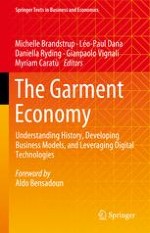2023 | OriginalPaper | Chapter
The Garments Economy: An African Perspective
Authors : L. B. Louw, S. van Antwerpen, E. Esterhuyzen
Published in: The Garment Economy
Publisher: Springer International Publishing
Activate our intelligent search to find suitable subject content or patents.
Select sections of text to find matching patents with Artificial Intelligence. powered by
Select sections of text to find additional relevant content using AI-assisted search. powered by
